
GHSCO Newsletter
March 2025
Volume2 Number1
Partner Stories2
Brown University Pandemic Center: A New Approach to Pandemic Prevention, Preparedness, and Response
Dr. Elizabeth (Beth) Cameron, Senior Advisor
Leah Lovgren, Associate Director of Research and Program Management
Brown University Pandmic Center
Pandemic Center Offices: Providence, Rhode Island USA, and Washington, D.C. USA
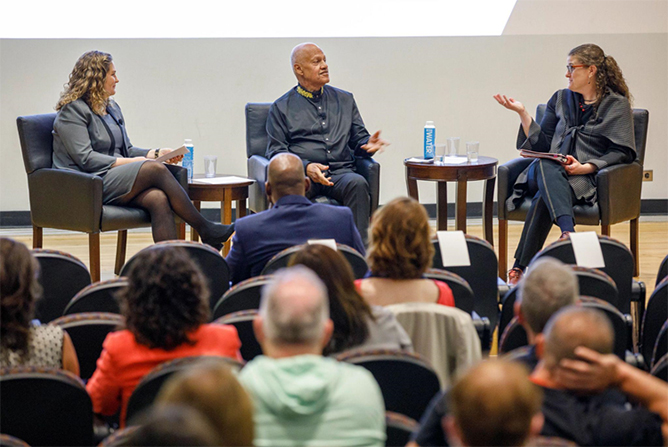 Image description: Pandemic Center leadership, Drs. Jennifer Nuzzo, Wilmot James and Beth Cameron
Image description: Pandemic Center leadership, Drs. Jennifer Nuzzo, Wilmot James and Beth Cameron
We are in an age of pandemic threats. COVID-19, the most consequential pandemic in a century, is the latest but not the last the world will face. COVID-19 exposed severe weaknesses in health security around the globe. Millions of lives were lost, and the impacts stretched across societies and were inequitably distributed across communities and countries. But there were important lessons in all that loss that must be translated into future action. We know another pandemic is coming, and new outbreaks continue to arise, including H5N1 influenza, Ebola, Marburg, and mpox.

The Pandemic Center deeply prioritizes impact — generating and analyzing data, translating that data to effective policy and practice, educating and inspiring the next generation of diverse public health leaders, and educating and engaging the public. The Pandemic Center builds on Brown University’s hallmark — a unique ability to combine cutting-edge research and interdisciplinary inquiry to make a positive impact in confronting the world’s great challenges. Like the University, the Pandemic Center is uniquely positioned in this field to work across disciplines and sectors, recognizing that this boundary breaking is critical to the innovative research, education and training that lead to policy and impact.
How We Work
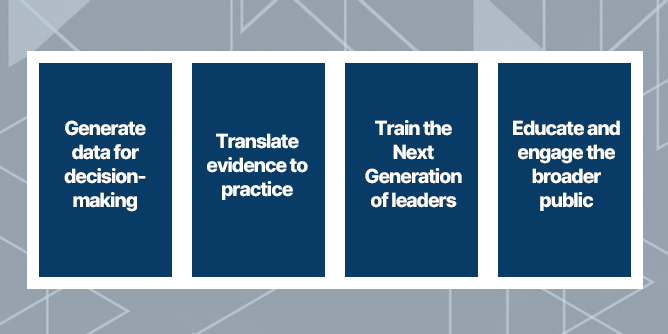
Our Signature Projects & Initiatives
<Advance Warning and Response Exemplars>
Through the Advance Warning and Response Exemplars (AWARE) project, the Pandemic Center and its collaborators are supporting research into and promotion of effective early warning, early detection and rapid response surveillance systems to significant public health events, including outbreaks of climate-sensitive infectious diseases (CSIDs). Critical to this work are the Center's in-country research partnerships in Brazil, Kenya, South Africa, and Vietnam, whose local expertise shapes the methodology and ensures findings can be meaningfully applied. As AWARE's insights are disseminated later this year, countries will be able to leverage this evidence to advocate for resources to strengthen their health security systems. The project is funded by the Gates Foundation, Gates Ventures and Wellcome Trust.
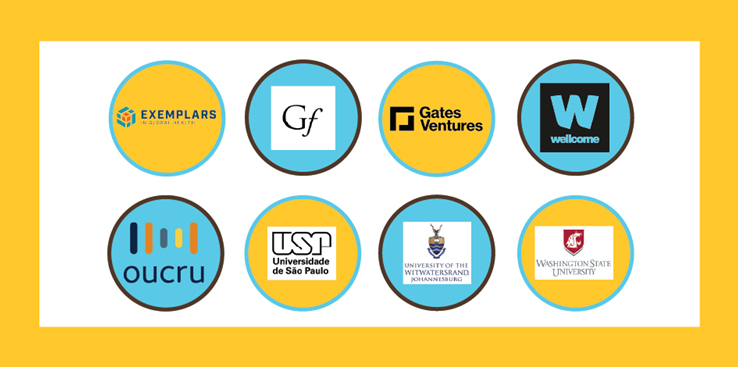 Image description: AWARE project funders and in-country research partners
Image description: AWARE project funders and in-country research partners
<Biosecurity Game Changes Fellowship Program>
The Pandemic Center has its own unique value proposition in training the next generation of pandemic decision-makers in the form of novel initiatives like the Biosecurity Game Changers Fellowship Program. Launched in 2024, the fellowship is designed to identify early-to-mid career professionals to represent the next generation of leaders responsible for preventing and preparing for the worst case health security challenges. The first of its kind, the fellowship provides experiential and operational learning, in partnership with institutions such as the Africa Centres for Disease Control and Prevention and with placements among key organizations like Coalition for Epidemic Preparedness Innovations, the Biological Weapons Convention Implementation Support Unit, the International Biosecurity and Biosafety Initiative for Science, the Pandemic Action Network, and Gavi, the Vaccine Alliance. Biosecurity Game Changers is an example of the Pandemic Center’s dedicated investment into the future of pandemic preparedness through the placement of fellows in key global organizations, which are laser focused on making an impact in this field.
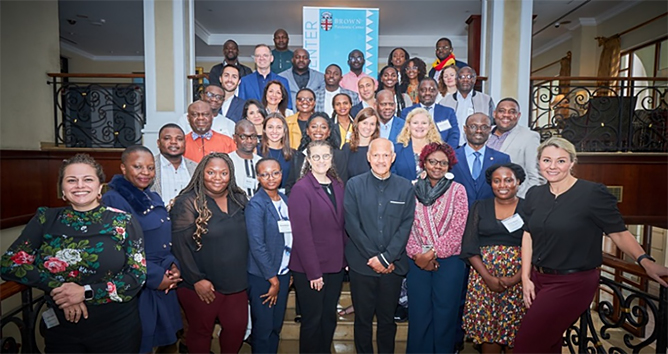 Image description: Biosecurity Games Changers Fellows, Pandemic Center team and guest speakers at the 2024 Gamechangers Workshop in Addis Ababa, Ethiopia
Image description: Biosecurity Games Changers Fellows, Pandemic Center team and guest speakers at the 2024 Gamechangers Workshop in Addis Ababa, Ethiopia
<Global Health Security Index>
Pandemic Center Director, Jennifer Nuzzo and Senior Advisors Wilmot James and Beth Cameron have been driving forces of the Global Health Security (GHS) Index since the development of its first iteration in 2019. The Index, now in the beginning stages of a third Africa-specific iteration, is an assessment of global health security capabilities and their ability to prepare for epidemics and pandemics. Broad engagement and multinational collaboration has been key to the Index development. In laying the groundwork for a 2025 Africa GHS Index, the project team has engaged with key stakeholders from organizations including the African Society for Laboratory Medicine (ASLM), World Organisation for Animal Health (WOAH), the Ministry of Health of Uganda, the Nigeria CDC, and the WHO Hub for Pandemic and Epidemic Intelligence.
<American Democracy and Health Security Initiative>

The Pandemic Center is also focused on understanding local best practices and replicable models in the United States from the COVID-19 response. Through the American Democracy and Health Security Initiative, the Center partnered with the CSIS Bipartisan Alliance for Health Security and the COVID Collaborative in order to conduct a groundbreaking, grassroots examination of America’s pandemic “lamplighters,” who innovated and bridged divides to illuminate the path forward in the darkest days of the COVID-19 pandemic. The American Democracy and Health Security Initiative spotlights these state and local lamplighters and harvests their hard-won lessons to ensure the most successful strategies can be sustained or replicated in future crises. The Pandemic Center is interested in extending this work to understand replicable local innovations and models for pandemic response around the world.
Research is at the core of the Pandemic Center’s mission but must be made accessible, including the public, in order to have impact. To that end, the Center is constantly working to share evidence-based scientific information from trusted global resources through initiatives including the monthly “Pandemics and Society” webinar series—free and open to the public— which examines key issues for improving our resilience to pandemics. The webinars feature high-level subject matter experts and all 20 past recordings are available on the Center’s website. Other notable outreach initiatives include the Tracking Report, a weekly review and aggregation of published data relevant to both domestic and international infectious disease outbreaks. The report serves to interpret, contextualize, and summarize timely information to keep readers informed about potential and ongoing health threats.
This sampling of projects and initiatives highlight the Pandemic Center’s commitment to leverage its own unique position as a multidisciplinary non-partisan research organization to drive an agenda of global health security and pandemic preparedness.
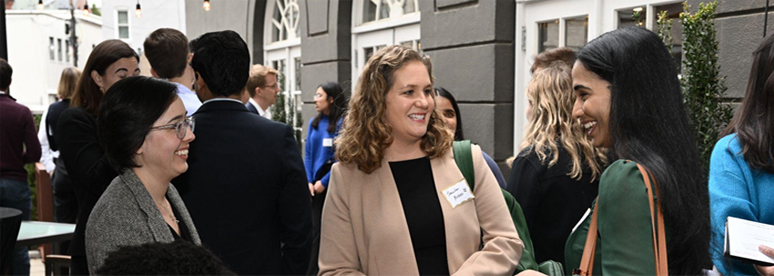 Image description: Pandemic Center Director, Dr. Jennifer Nuzzo and workshop guests in Washington D.C.
Image description: Pandemic Center Director, Dr. Jennifer Nuzzo and workshop guests in Washington D.C.